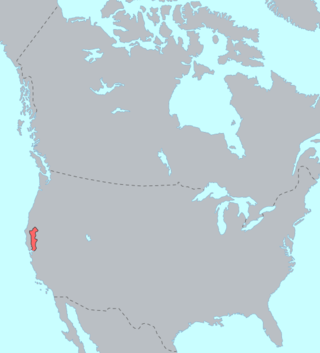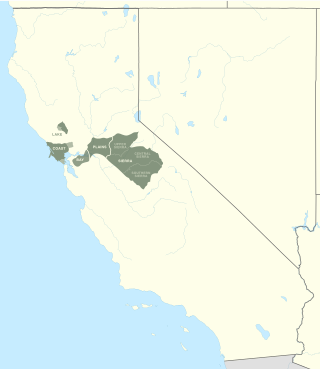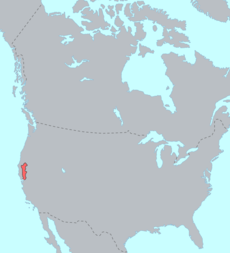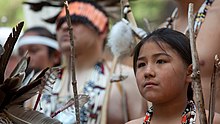
Penutian is a proposed grouping of language families that includes many Native American languages of western North America, predominantly spoken at one time in British Columbia, Washington, Oregon, and California. The existence of a Penutian stock or phylum has been the subject of debate among specialists. Even the unity of some of its component families has been disputed. Some of the problems in the comparative study of languages within the phylum are the result of their early extinction and limited documentation.

The Wintu are Native Americans who live in what is now Northern California. They are part of a loose association of peoples known collectively as the Wintun. There are four major groups that make up the Wintu people. There northern Wintun (Wintu) and the Central Wintun (Namlaki) are most common. Others are the Nomlaki and the Patwin. The Wintu language is part of the Penutian language family but there are different dialects. Before the European colonization, different Wintun communities interacted with each other but were more inclined to communicate with others tribes to the east and west.

Utian is a family of Indigenous languages spoken in Northern California, United States. The Miwok and Ohlone peoples both spoke languages of the Utian language family. It has recently been argued that the Utian languages and Yokuts languages are sub-families of the Yok-Utian language family. Utian and Yokutsan have traditionally been considered part of the Penutian language phylum.

Plateau Penutian is a family of languages spoken in northern California, reaching through central-western Oregon to northern Washington and central-northern Idaho.

The Pomoan, or Pomo, languages are a small family of seven languages indigenous to northern California spoken by the Pomo people, whose ancestors lived in the valley of the Russian River and the Clear Lake basin. Four languages are extinct, and all surviving languages except Kashaya have fewer than ten speakers.

Wintuan is a family of languages spoken in the Sacramento Valley of central Northern California.
The Nomlaki are a Wintun people native to the area of the Sacramento Valley, extending westward to the Coast Range in Northern California. Today some Nomlaki people are enrolled in the federally recognized tribes: Round Valley Indian Tribes, Grindstone Indian Rancheria or the Paskenta Band of Nomlaki Indians. The Nomlaki were bordered by the Wintu (Wintun) in the north, the Yana in the northeast and east, the Konkow (Maiduan) in the east, the Patwin (Wintun) in the south, and the Yuki in the west.

The Patwin are a band of Wintun people in Northern California. The Patwin comprise the southern branch of the Wintun group, native inhabitants of California since approximately 500.

The Miwok or Miwokan languages, also known as Moquelumnan or Miwuk, are a group of endangered languages spoken in central California by the Miwok peoples, ranging from the Bay Area to the Sierra Nevada. There are seven Miwok languages, four of which have distinct regional dialects. There are a few dozen speakers of the three Sierra Miwok languages, and in 1994 there were two speakers of Lake Miwok. The best attested language is Southern Sierra Miwok, from which the name Yosemite originates. The name Miwok comes from the Northern Sierra Miwok word miw·yk meaning 'people.'

Solano is an unclassified extinct language formerly spoken in northeast Mexico and perhaps also in the neighboring U.S. state of Texas. It is a possible language isolate.

The Yuki–Wappo or Yukian languages are a small language family of western California consisting of two distantly related languages, both now extinct.
Wintu-Nomlaki traditional narratives include myths, legends, tales, and oral histories preserved by the Wintu and Nomlaki people of the western Sacramento Valley in northern California.

The Kletsel Dehe Wintun Nation of the Cortina Rancheria is a federally recognized tribe of Indigenous people of California. They are Wintun people, who historically spoke Wintuan languages.
The Cachil DeHe Band of Wintun Native Americans of the Colusa Native Americans Community of the Colusa Rancheria is a federally recognized tribe of Wintun Native Americans from central California.
The Grindstone Indian Rancheria of Wintun-Wailaki Indians is a federally recognized tribe and ranchería of Wintun and Wailaki Indians from northern California. As of the 2010 Census the population was 164.
Nomlaki (Noamlakee), or Wintun, is a moribund Wintuan language of Northern California. It was not extensively documented, however, some recordings exist of speaker Andrew Freeman and Sylvester Simmons. There is at least one partial speaker left per Golla (2011). Nomlaki Indians, or in their own language Nomlāqa Bōda; nom is ‘west’, and lāqa is a verb form of ‘speak’, thus ‘western speakers’.
Patwin (Patween) is a critically endangered Wintuan language of Northern California. As of 2021, there was one documented first language speaker of Patwin. As of 2010, Patwin language classes were taught at the Yocha Dehe Wintun Nation tribal school.
The Yocha Dehe Wintun Nation is a federally recognized tribe of Wintun people, specifically Patwin people or southern Wintun, in Yolo County, California. They were formerly known as the Rumsey Indian Rancheria of Wintun Indians of California.
Victor Golla (1939–2021) was a linguist and a leading expert on the indigenous languages of California and Oregon, especially the Pacific Coast Athabaskan subgroup of the Athabaskan language family and the languages of the region that belong to the Penutian phylum. He was emeritus professor of anthropology at Humboldt State University and lived in Trinidad, California.

The Paskenta Band of Nomlaki Indians, or in their own language Nomlāqa Bōda, is a federally recognized tribe of Nomlaki people. The Nomlaki are Central Wintun, or River and Hill Nomlaki, an indigenous people of California, located in Tehama and Glenn counties.













